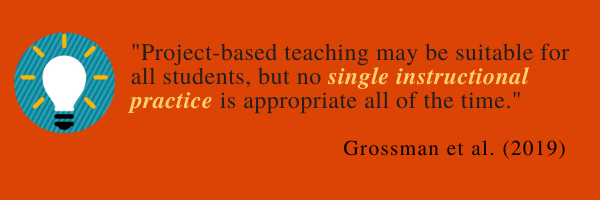
By: Ashlee M. C. Foster MSEd, Instructional Design Specialist | Oregon State University Ecampus
Did you know a pedagogical approach exists that positively impacts student academic achievement and engages them as active participants in learning? Great news…there is! Let me introduce you to the world of Project Based Learning (PBL).
What is PBL?
PBL is a student-centered pedagogical approach where students, both individually and within small groups, engage with meaningful, relevant, and authentic projects which result in a product. Oftentimes, PBL is commonly associated and/or thought to be interchangeable with Problem Based Learning. However, there is a distinction between the two. The principal focus of PBL is on the active construction of knowledge. Additionally, student autonomy, beliefs, values, and motivations are situated as a fundamental driving force of the instructional approach.
What are the characteristics of PBL?
The essence of PBL is anchored in attributes, which foster high-quality learning experiences. Direct instruction is no longer the principal mechanism for delivery. Negotiation of knowledge between the educator and the students occurs through an exchange of ideas, questioning, inquiry, considerations, and perspectives. PBL often engages students in an ongoing process consisting of investigation, collection, analysis, prototyping, testing, peer/instructor feedback, revisions, and reflection. Learner autonomy is key in that students make their own decisions about various aspects of the projects (i.e., line of inquiry, collaborative processes, application of feedback, types of revisions, solutions).
Is it effective? Prove it!
As reported by Chen and Yang (2019), a positive impact on student achievement has been observed across 20 years (i.e. 1998-2017) of PBL peer-reviewed literature. The researcher’s principal investigation was to compare traditional instruction with that of PBL. Traditional instructional delivery was found to prompt students to apply low-level cognitive processes (e.g., understand, remember). Whereas, PBL can encourage the development of (HOTS) Higher Order Thinking Skills (i.e., analysis synthesis) and metacognitive skills (i.e., regulation, monitoring, self-directed learning, evaluation, assessment). According to the meta-analysis, the aforementioned benefits were found not to be impacted by academic discipline, educational stage (undergraduate, post-baccalaureate, graduate), or geographic location. This is great news for our distance and hybrid learners!

How do I get started?
When considering PBL there are a few questions to reflect on before implementing this practice. First, ask yourself, is this a best-fit approach? Consider the academic discipline, subject content, course learning outcomes, your instructional style, student attributes, and the intended goals to answer this foundational question. A word of caution is to use PBL in a way that is relevant, authentic, and collaborative in nature. Steel clear of using projects as a shiny solution. Lastly, contextualize the project. Doing so will help students connect the project to their academic career, professional development, and personal growth. Remember to share the ‘why’!
Project Examples
Here are a few project examples to spark some ideas:
- solve a problem (e.g., uninformed voting)
- generate a plan (e.g., foster sustainability)
- create a product (e.g., computer/mobile application, oral history interviews)
- seek valid answers and recommend solutions (e.g., electing national officials)
- engage with a persistent issue in a tangible way (e.g., advocating, protesting, public speech)
Do you have an example to share?
Respond in the comments if you currently use, have used, or intend to incorporate PBL in your course. Do you have any tried and true strategies for effective projects? Have you experienced any wins or challenges? Share with the community and join the discussion. Make sure to return to read Project-Based Learning (Part 2) – Mindful Design for practical implementation tips!
References
- Almulla. (2020). The Effectiveness of the Project-Based Learning (PBL) Approach as a Way to Engage Students in Learning. SAGE Open, 10(3)
- Budhai, S. (2016, January 29). Designing Effective Team Projects in Online Courses [blog]. Faculty Focus.
- Chen, & Yang, Y.-C. (2019). Revisiting the effects of project-based learning on students’ academic achievement: A meta-analysis investigating moderators. Educational Research Review, 26, 71–81.
- Grossman, Dean, C. G. P., Kavanagh, S. S., & Herrmann, Z. (2019). Preparing teachers for project-based teaching. Phi Delta Kappan, 100(7), 43–48.
- Guo, Saab, N., Post, L. S., & Admiraal, W. (2020). A review of project-based learning in higher education: Student outcomes and measures. International Journal of Educational Research, 102, 101586.

